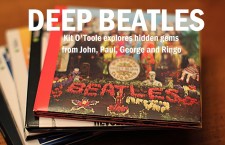Everyone knows that the Beatles wrote first-rate material from their first album through their finale Let It Be. However, they proved equally adept at covering artists ranging from the Shirelles to Buck Owens. They paid tribute to early idols Buddy Holly and Carl Perkins, yet also exposed audiences to little-known American R&B singers such as Larry Williams and Arthur Alexander. From country to Motown, rock to Broadway, the Beatles demonstrated how they combined various genres to create their original catalog.
For the next few columns, Deep Beatles spotlights some of their best covers; for the purposes of this series, only cover songs that appeared on the original Beatles albums will be discussed. Songs they covered during their Hamburg and Liverpool shows — as well as those they performed for only the BBC — merit another category and will be examined in the future.
One of their most unusual covers, “Boys” functioned as a vehicle for Ringo Starr and became a concert favorite. Starr still performs the song today, and Green Day accompanied him for a rousing version during the drummer’s induction into the Rock and Roll Hall of Fame. “Boys” dates from 1960 and was the B-side to the Shirelles’ hit single “Will You Love Me Tomorrow.” It was an interesting selection for the Beatles: As Paul McCartney revealed in Anthology, they had not thought of how audiences might respond to the Beatles singing a “girl group” song with the lyric “I’m talking ‘bout boys.”
Clearly fans did not read any double meaning into the lyrics, as it became — and remains — an early favorite.
“Boys” started life as a single written by Luther Dixon and Wes Farrell. Dixon served as the Shirelles’ chief collaborator, and he co-wrote their later hits “Baby It’s You” and “Soldier Boy.” “Will You Love Me Tomorrow,” the quartet’s best-known song, was released in November 1960; the Gerry Goffin and Carole King-penned single featured “Boys” as the flip side. A year later, the Beatles began performing the B-side in their live shows. Before Starr joined the band, original drummer Pete Best handled lead vocals on the track.
During the Beatles’ marathon Please Please Me recording session on February 11, 1963, the group recorded “Boys” in one take. While he had recently joined the band, Ringo Starr knew the song well; he had previously performed the tune with his former band Rory Storm and the Hurricanes. Under George Martin’s direction, the session featured Paul McCartney on bass and backing vocals; John Lennon on rhythm guitar and backing vocals; George Harrison on lead guitar and backing vocals; and Starr on drums and lead vocals.
Their energetic rendition gave audiences a preview of their live shows, with Starr’s pounding drums, Harrison and Lennon’s driving guitar riffs, and McCartney’s soulful bass lines adding a distinctly rock edge to the track.
As Harrison, Lennon, and McCartney enthusiastically contribute the “bop-shoo-wopp” responses, Starr’s simple yet raw voice combines cuteness with sexuality. “My girl says when I kiss her lips / Gets a thrill through her fingertips,” he declares as McCartney’s screams can be heard in the background. The song chugs along to the chorus, with Starr returning to his cuddly, funny image in the lines “Well, I talk about boys, now / What a bundle of joy.” Yet some raspiness enters the drummer’s voice as he screams “all right, George!”
Harrison executes a piercing solo, again lending a rougher edge to the song’s original soulful glossiness. McCartney’s bluesy bass subtly recalls the song’s R&B roots. As Starr repeats the first chorus and the refrain, “Boys” intensifies in volume, letting fans imagine the Beatles’ roof-raising Cavern Club concerts.
While “Boys” was never released as a single, it quickly became a fan favorite. The Beatles often performed it in concert, on television, and on the BBC. Over the years, it became “Ringo’s song,” with the Shirelles’ version often overlooked. The Beatles brought an element of danger to the song – and, in a fascinating sense, transformed the lyrics: After all, the song was first written from a female perspective.
With just a few pronoun changes and a healthy dose of rock guitars, the Beatles made “Boys” their own, as they would with several other covers. While they continually moved forward in their relatively short recording span, the group never failed to pay tribute to their idols and inspirations.
- How John Lennon Came Roaring Back on the Beatles’ White Album - November 22, 2023
- Five ‘With the Beatles’ Deep Cuts That Illustrate Their Lasting Debt to R&B - November 20, 2023
- Five Must-Hear Deep Cuts from the Beatles’ ‘Past Masters’ - March 7, 2023


